Educators
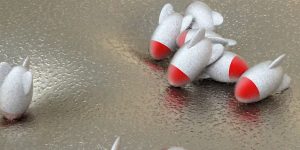
[Dis]content
Gloria Fan Duan; Blake Fall-Conroy; Anaïs Morales; Judd Morrissey, Mark Jeffrey, & Abraham Avnisan; Alan Perry; Chengan Xia; Kio Zhu
[Dis]content probes cultural objects and historical sites to examine the role of art and artifact in the construction of collective memory.
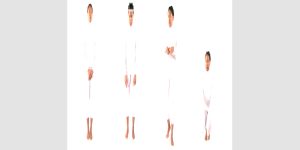
[Dis]connect
Lee Blalock; Ashara Renfroe; Anna Christine Sands; Julia Tsai; Anne Wilson & Shawn Decker
[Dis]connect interrogates the struggle for connection despite the ubiquity of instant communication, underscoring the role these technologies play in redefining our relationships to others and to ourselves.
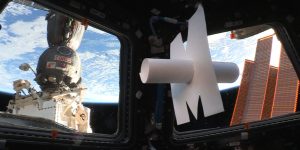
[Dis]orient
Eduardo Kac; Jakyung Lee; Bun Stout; Tongqi Wang; Ling Zeng
[Dis]orient explores real and imaginary spaces of isolation and introspection through experimental poetry and performance.
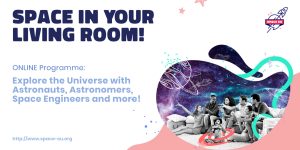
Space in your Living Room!
Space in Your Living Room! is an online program that brings astronauts, artists, space scientists and engineers, into living rooms across Europe and beyond. It is a series of fun activities, exciting challenges with amazing prizes, and live events for young people, families and educators. At Ars Electronica Festival we will share conversations between astronauts and artists, and the youth art projects created during the program: including stories, speculative design and young reporters stories.
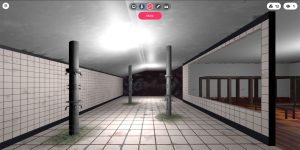
WADS (↑ ← → ↓) Exhibition in Mozilla Hub
RISE ITICA (CY)
WADS, a digital garden of commoning formed by 21 local artists, sets out to explore the potential of digital hubs as grounds of artistic and technological co-creation. The digital exhibition is created and experienced in the online environment of Mozilla Hubs and will be accessible through the Ars Electronica Digital Platform.

What We Eat
Laurie Frick (US)
As part of Heartbeat of the Earth, a series of online interactive artworks interpreting climate data, data artist Laurie Frick’s work examines the impact of individual foods on the environment using hand-drawn data visualisations, color coded and sized by CO2 output.
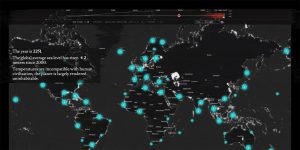
Coastline Paradox
Timo Aho (FI) & Pekka Niittyvirta (FI)
As part of Heartbeat of the Earth a series of online interactive artworks interpreting climate data, using Google Maps and Street View, artists Pekka Niittyvirta and Timo Aho visualize the predicted sea level rise – and the number of people likely to be displaced – in more than 200 different locations between the years 2000 and 2300.
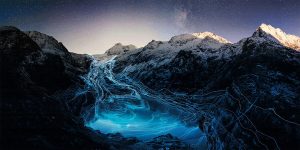
Timelines
Fabian Oefner (CH)
As part of Heartbeat of the Earth, a series of online interactive artworks interpreting climate data, artist Fabian Oefner explores the retreat of the Rhone and Trift glaciers in Switzerland over the last 140 years by using precise digital coordinates and special drone captures.
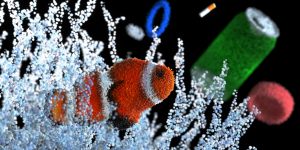
Diving into an Acidifying Ocean
Cristina Tarquini (IT/FR)
As part of Heartbeat of the Earth, a series of online interactive artworks interpreting climate data, digital artist Cristina Tarquini invites us to dive into our acidifying oceans using data from NOAA. Cristina Tarquini (IT) created an interactive data visualisation, inviting you to dive into the ocean and explore the impact of rising temperatures & in turn rising CO2 levels on marine life, over time.
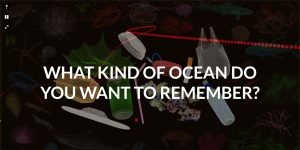
Diving into an Acidifying Ocean – Q&A
Cristina Tarquini (IT/FR), Frédéric Gazeau (FR) & Freya Murray (UK)
Join the Q&A with the artist who created the online experiment and the scientist who advised her.
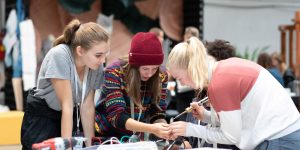
create your world 2020
Kepler's Garden on the JKU campus
The create your world festival invites young people and the young at heart to create social and creative closeness – with physical distance. An exchange network will share projects, ideas and talents. This platform for education, experiments and different future scenarios will show a great variety of young experts, all of whom can learn from each other.
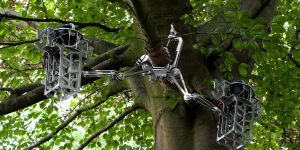
Garden Exhibition
Kepler's Garden on the JKU campus
The Garden Exhibition on the JKU campus in Linz is dedicated to the interplay of art, research and industry/design. Selected works of art take up the metaphor of the garden playfully and in different ways.
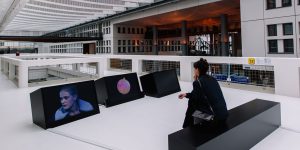
(UN)REAL
Science Gallery Network (INT)
The Science Gallery Garden at the Ars Electronica Festival will explore trust, technology, global challenges, arts innovation and new forms of digital storytelling. A showcase from the world’s only university network dedicated to public engagement with science and art, it will feature interactive workshops, experimental audio and visual experiences, livestreamed events and a specially-curated digital archive.
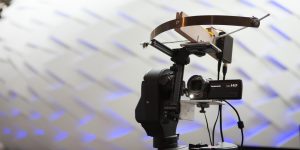
#festivalstories
Lennard Barth (AT), Celine Fahrngruber (AT), Samuel Gerersdorfer (AT), Joshua Haiden (AT), Elias Illig (AT), Sophie Kaufmann (AT), Irina Pitterle (AT) Xaver Quintus (AT)
Young filmmakers, young talents, young professionals are asked to film mini-documentaries that capture their perspectives and impressions of the festival’s themes. Instead of one general documentation of the festival, eight short stories will be produced, including different slots and protagonists.
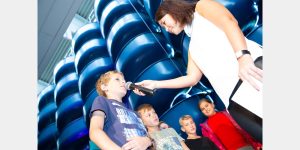
Talent Talks
As a complementary international part of the category u19–create your world of the Prix Ars Electronica, jury member and moderator Conny Lee (AT) is talking with some of this years winners about their ideas, creativity and future visions.
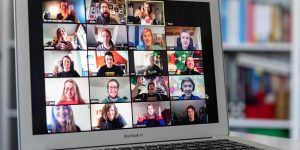
Jugend hackt remote: digital gardening
Jugend hackt Austria (AT), c3 (HU), mb21 (DE), ArtechLAB (NL), Ars Electronica (AT)
We present the outcome of Jugend hackt remote: digital gardening, which is a hackathon for young people from 12 to 18 years. It took place during August 29th and was inviting young coders from Austria, Germany, Hungary and the Netherlands

Young Animations
Every year young gifted filmmakers submit their weird, subtle, witty, utopian, critical and dystopian works for the Prix Ars Electronica’s category of “u19—create your world”, for the mb21 and the c<19 (HU). They show us their strong imagination, their deep understanding of certain topics, and all expressed with their abilities within one media.

The award ceremony of category u19–create your world
The award ceremony of category u19–create your world is the real highlight of the create your world festival. All 24 winning projects are awarded here. This year, the event serves as a kick-off for the subsequent networking opportunities within the create your world festival.
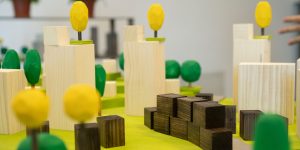
Baukasten der Zukunft
Louise Amcha (AT), Hannah Ertl (AT), Leonid Stanislav Lang (AT) und Marlene Urban (AT)
The Baukasten der Zukunft (engl.: construction kit of the future) is an interactive thought experiment by a young group of artists. The project consists of a large, inviting wooden model of a landscape in which visitors can plan their own city. In addition, at the push of a button, a computer program builds a version of a city under the same conditions. Afterwards, the advantages and disadvantages of each version have to be evaluated and the best solution for our future has to be found.
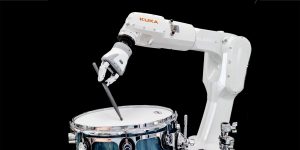
robodrum
The robodrum project is a robotic setup consisting of 4 KUKA robotic arms equipped with drums, which doesn’t aim to replicate a human performance exactly, nor to be better or faster than one. Instead, it becomes an algorithmic system that allows visitors to leave acoustic traces.


